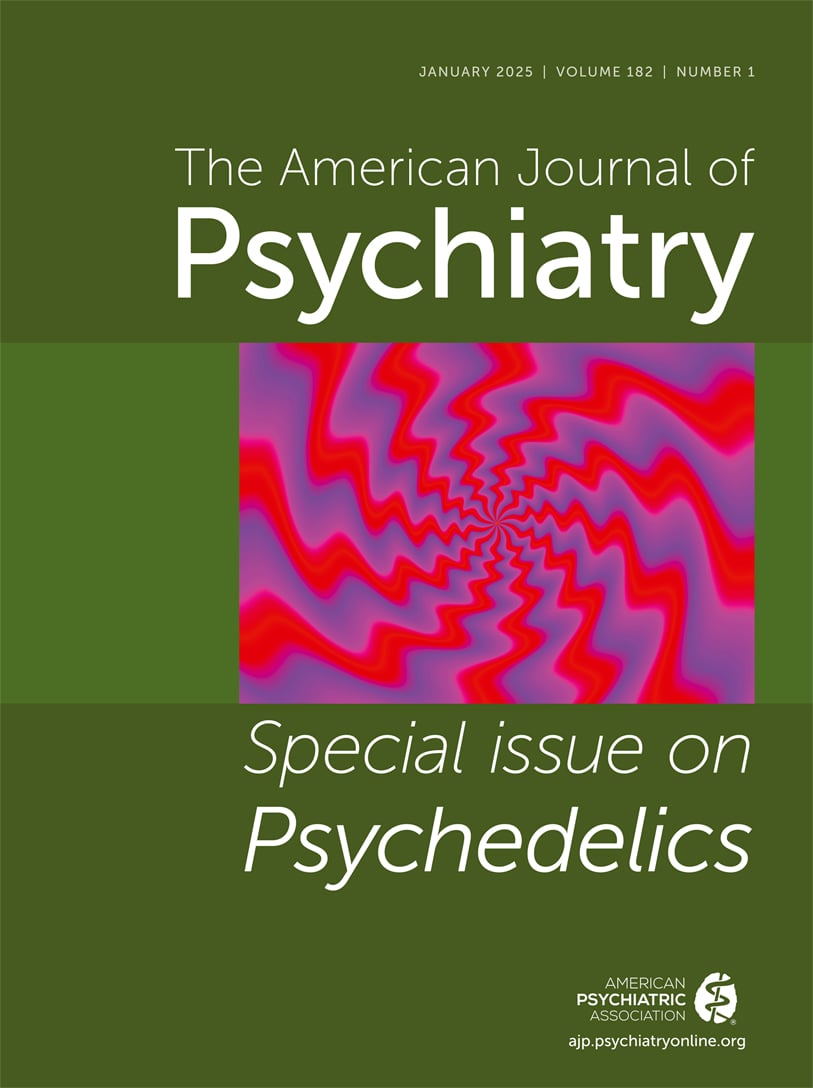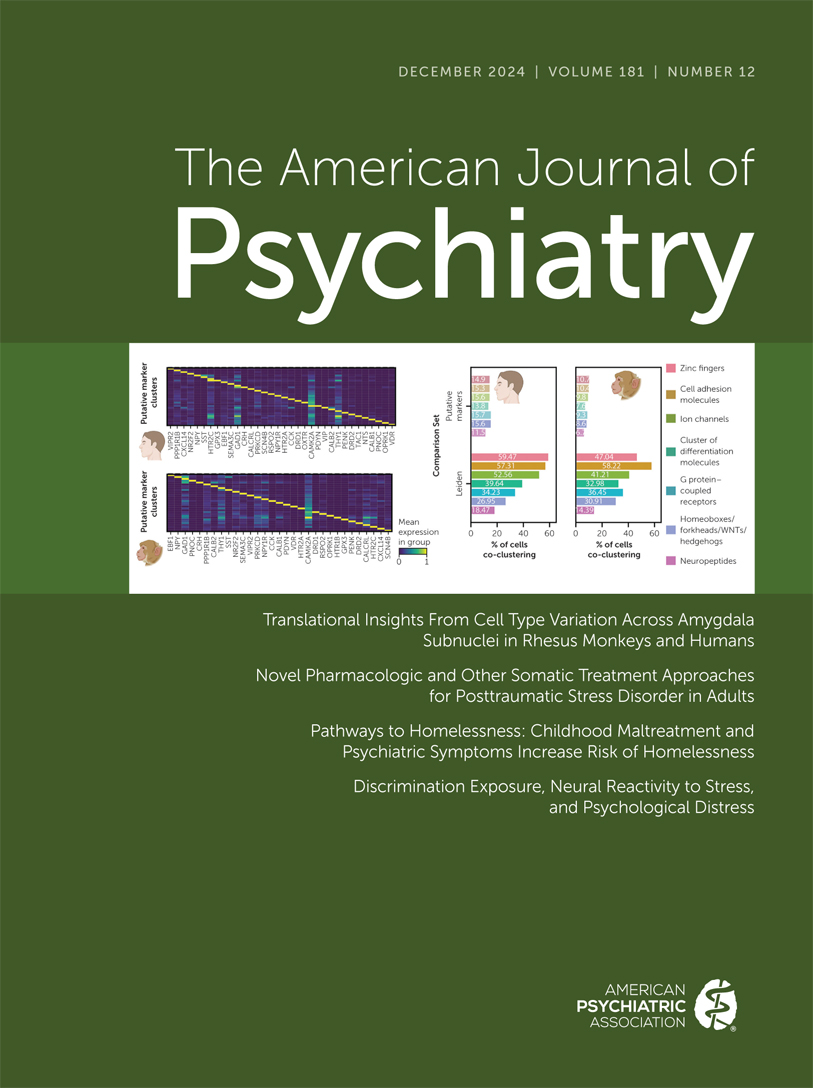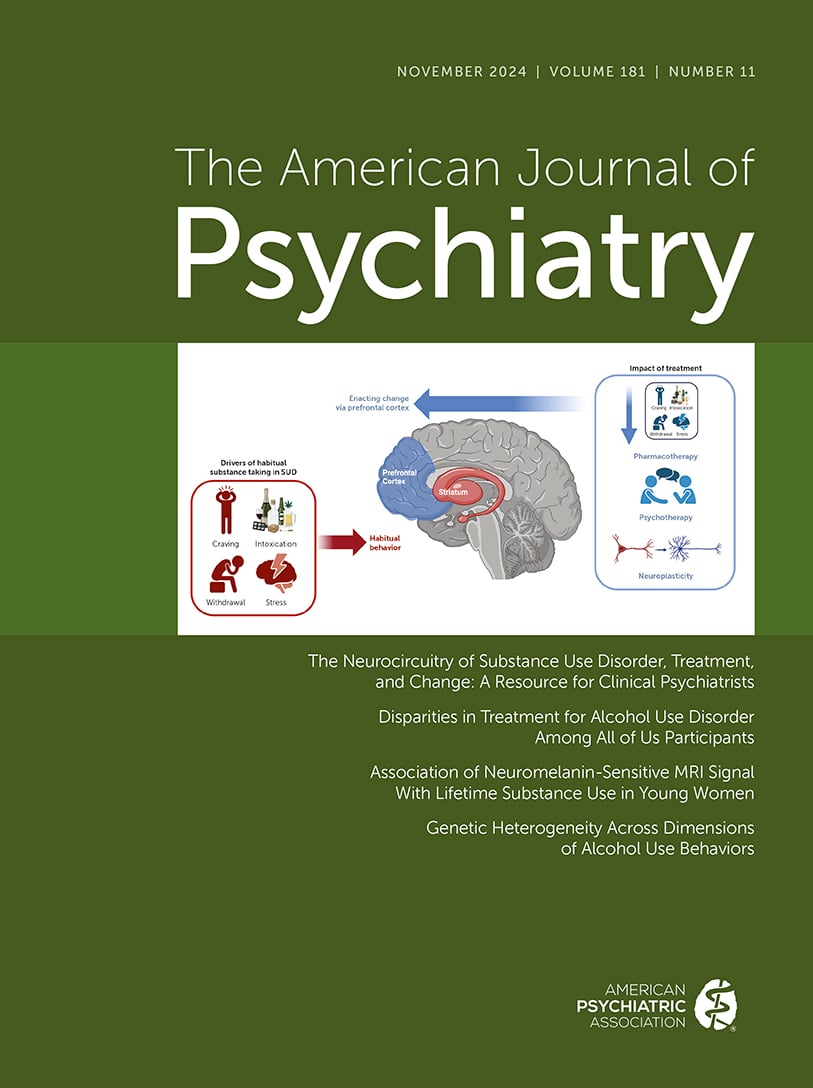American Journal of Psychiatry
- Volume 125
- Number 9
- March 1969
Article
Publication date: 01 March 1969
Pages1160–1165Although pharmacotherapy has become the most widely used psychiatric treatment, psychiatric education reveals a striking neglect of clinical psychopharmacology. Our educational objective should be the development of knowledge in pharmacopsychiatry that is ...
https://doi.org/10.1176/ajp.125.9.1160Publication date: 01 March 1969
Pages1166–1171Addiction is more precisely comprehended by understanding the personality of the addict rather than the chemical or physiological properties of the addicting agent. The addict has a unique relationship with his chosen addicting substance; without this ...
https://doi.org/10.1176/ajp.125.9.1166Publication date: 01 March 1969
Pages1172–1179Fifty-nine percent of a state hospital sample of patients reported having experienced poverty. Social class was found to be inversely related to the experience of poverty but not to the feeling that it contributed to one's illness. Patients from higher ...
https://doi.org/10.1176/ajp.125.9.1172Publication date: 01 March 1969
Pages1180–1186The authors describe their experience operating a health careers program in a disadvantaged urban area. They feel that this type of mental health service is ideal for such a setting. The health careers strategy is designed to: 1) provide the manpower for ...
https://doi.org/10.1176/ajp.125.9.1180Publication date: 01 March 1969
Pages1187–1191This brief survey is intended to outline the types of persecution trauma commonly seen among the survivors of Nazi concentration camps. Many psychiatric evaluations of these victims for purposes of compensation under the German law of restitution are, the ...
https://doi.org/10.1176/ajp.125.9.1187Publication date: 01 March 1969
Pages1192–1197A program was set up to instill in surgical residents an awareness of the importance of emotional reactions in surgical patients. In weekly sessions patients were presented and their management discussed; their emotional distress was examined in regard to ...
https://doi.org/10.1176/ajp.125.9.1192Publication date: 01 March 1969
Pages1198–1202The systems of home treatment for the mentally ill observed by the authors in three cities abroad—Moscow, Leningrad, and Amsterdam—are based in part upon the delegation of a broad area of responsibility to the psychiatric nurse. The greatly expanded role ...
https://doi.org/10.1176/ajp.125.9.1198Publication date: 01 March 1969
Pages1203–1213Reviewing a number of recent studies pertinent to the common belief that religion is a basis of sound mental health, general well-being, and humanitarianism, this author finds no empirical support for the theory. He concludes that contemporary religious ...
https://doi.org/10.1176/ajp.125.9.1203Publication date: 01 March 1969
Pages1214–1217Fifteen derealized patients reporting distortions in time and/or space perception and 15 matched controls were tested for differences in their perception of time and space. When the test responses were "fed back" as the input on subsequent trials in order ...
https://doi.org/10.1176/ajp.125.9.1214Publication date: 01 March 1969
Pages1218–1222The premises upon which the National Health Service was established have influenced the development of priorities in British psychiatry since 1948. Thus the egalitarian concept of a certain acceptable standard of service for everyone meant that initial ...
https://doi.org/10.1176/ajp.125.9.1218Publication date: 01 March 1969
Pages1223–1226Under the National Health Service the status of British psychiatry has improved in relation to that of general medicine. One of the most important factors has been the ending of the comparatively isolated position of psychiatry. Another has been increased ...
https://doi.org/10.1176/ajp.125.9.1223Publication date: 01 March 1969
Pages1226–1231The National Health Service was established at a time when psychiatry as a specialty was undergoing a period of rapid development and change. This coincidence, the author feels, has helped to determine not only the type of psychiatry practiced and the ...
https://doi.org/10.1176/ajp.125.9.1226Publication date: 01 March 1969
Pages1232–1238Defining psychotherapy broadly as "a way of handling the experience of illness" in which the therapist's personality becomes part of the healing process, the author traces its course in the history of British psychiatry. He points out that, although the ...
https://doi.org/10.1176/ajp.125.9.1232Publication date: 01 March 1969
Pages1242–1247The author presents a brief review of the theory and practices of behavior therapy, describing the various methods and their usefulness. He cites several studies which indicate more consistent success for behavior therapy than for analysis, in complex as ...
https://doi.org/10.1176/ajp.125.9.1242Publication date: 01 March 1969
Pages1247–1251The authors point out the present failure of many psychiatrists to recognize potentially suicidal patients. They describe a five-stage clinical approach to treatment of such patients, utilizing a continuous assessment of suicidal potential. The approach ...
https://doi.org/10.1176/ajp.125.9.1247Publication date: 01 March 1969
Pages1252–1258In evaluating 53 perpetrators of homicide, the author noted that a history of violent child-rearing, a severe superego, and an altered state of consciousness just prior to the act of homicide were marked characteristics of a majority of these individuals. ...
https://doi.org/10.1176/ajp.125.9.1252Publication date: 01 March 1969
Pages1258–1259The author reports an acute, though brief, psychotic reaction to marihuana soaked in scopolamine. As young people continue to experiment with various drugs it is important for therapists to be aware of the possibility of scopolamine use when treating ...
https://doi.org/10.1176/ajp.125.9.1258Past Issues
View Issues Archive
Vol. 182 | No. 1

Vol. 181 | No. 12

Vol. 181 | No. 11
